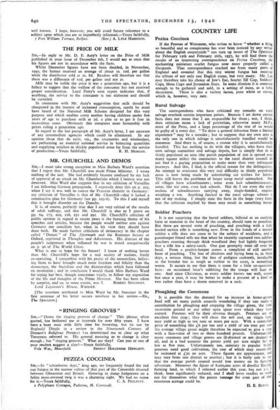MR. CHURCHILL AND DEMOS
S1R,—I must take strong exception to Miss Barbara Ward's assertion that I regret that Mr. Churchill was made Prime Minister. I wrote nothing of the sort. She had evidently become confused by my lack of approval of an attack on Mr. Chamberlain which I believe was not deserved. Miss Ward also suggests that in my criticism of Versailles I am following German propaganda. I expressly deny this on p. 295, when I say it was well to coerce the Prussian element in Germany: my criticism of Versailles is that of Mr. Churchill—that it lacked a constructive plan for Germany (see pp. 195-6). To this I add myself that it brought disorder on the Danube.
It is, of course, perfectly true that I am very critical of the results of adult suffrage, and that Mr. Churchill is also so I prove on PP. 64, 173, 209, 228, 251 and 292. Mr. Churchill's criticism of public opinion in regard to recent years is the burning theme of his speeches and articles, because the people would neither arm against Germany nor conciliate her, when in his view they should have done both. He made further criticisms of democracy in the chapter called " Demos " of The Aftermath and the Romanes lecture at Oxford, reprinted in Thoughts and Adventures. His distrust of the people's judgement when inflamed by war is stated unequivocally on p. 96 of The World Crisis.
What is one to hope for the future? I know of nothing better than Mr. Churchill's hope for a real society of nations, freely co-operating. I sympathise with his praise of the monarchies, believ- ing them to have brought much more freedom and felicity than the democracy, the Socialism and the dictatorships which have followed on revolution ; and in conclusion I would thank Miss Barbara Ward for trying her best, though sometimes vainly, to follow my exposition of the life and thoughts of the Prime Minister. She has been taken
by surprise, and so, to some extent, was I. ROBERT SENCOURT. Lord Leycester's House, Warwick.
[The assertion attributed to Miss Ward by Mr. Sencourt in the first sentence of his letter occurs nowhere in her review.—En., The Spectator.]










































 Previous page
Previous page